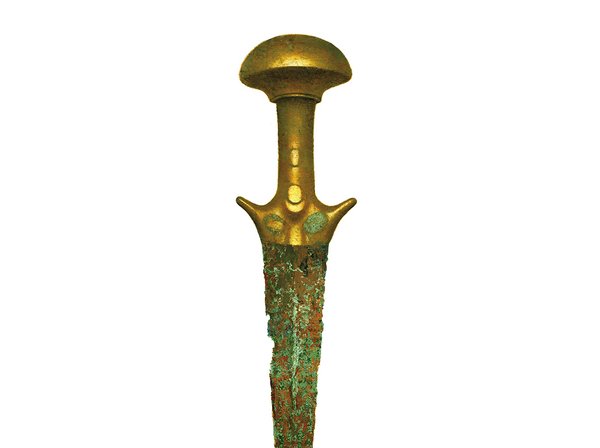As you can see from this example, the new find from Denmark is missing some of the grip and the lower guard:-
[ Download ]
| Matthew Bunker wrote: |
| Here is a more intact example of the Hornknap style of sword. The 'horn' part refers to the shape of the 'cap' , not the material.
As you can see from this example, the new find from Denmark is missing some of the grip and the lower guard:- |
| Craig Johnson wrote: |
| Looks to be a nice piece and interesting hilt. Not sure if its missing an upper section to the pommel or not. Also maybe a sandwich construction but tough to tell from pics. Hope to see this after conservation |
| Mark Lewis wrote: | ||
That's a great find! So few swords have been found in Iceland... It looks like the hilt may be in pretty good shape underneath the corrosion. The upturned tips on the upper hilt and downward tips on the lower makes me think this could be a type Q, meaning the hilt is complete as is. "Plain" hilts of type M and Q seem to have been especially common in Norway, so no surprise that Norwegian settlers might bring a few to Iceland. |

| Craig Johnson wrote: |
| Here are some really spectacular items found in Scotland. Sword, with scabbard bits, Spear head with gold all Bronze age find in larger complex being excavated for Futball Fields. Really great things!!
Scottish Bronze Age Sword and more BBC story The Sun Story Hmm is this the same find?? Sept 16 Find Best Craig edited to add links edited again to add possible dup from Sept16 |
| Mark Lewis wrote: |
| Hi Niels,
Very interesting find, thanks for sharing! I hope more information will eventually be forthcoming... The pommel seems to be your basic tea-cozy shape, Petersen's type X? Difficult to tell from the camera angle and physical condition... It would be pretty unusual (but not unique) for there to be any copper/silver embellishments on this type of pommel. If the inscription is literally "in nomine Dei" and not the similar (and common) "in nomine Domini", then this also seems noteworthy. Actually, I can only think of one example of a sword where "Dei" (genitive form of "Deus"/God) is used - in an inscription of "homo Dei" on the obverse of an Ingelrii sword. In this time frame, and this type of inscription, and paired with this type of pommel, an iron-inlaid inscription would be typical I think - so again, an unusual feature if it is the inscription that is inlaid in copper/silver. So either way, I think there are questions that remain to be answered! :?: |
| Mark Moore wrote: |
| I will be keeping an eye on this. I would be greatly interested in what the sheath material is composed of on the fragment that was found! ;) .....McM |